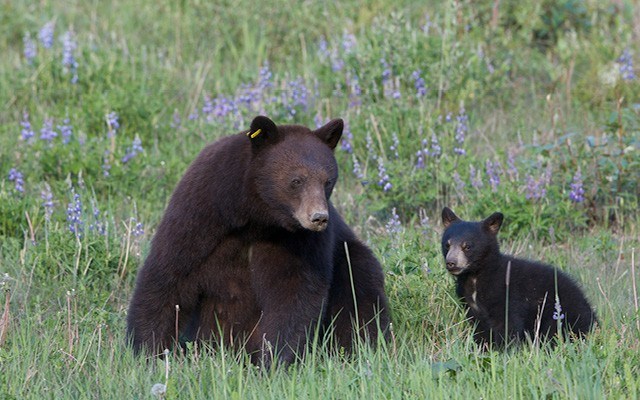Last week was very emotional for the families that live on Ski Jump Rise in Rainbow. Living so close to nature is both a gift and a responsibility. The past few days have taught me a lot about the amazing people in our community.
On Tuesday, April 19, my daughter noticed what we thought was a bear lying on a mound in the neighbour’s backyard. After watching on and off from the window for more than an hour and seeing no real movement, we went outside and confirmed it was indeed a mama bear with two cubs just a short distance away. She had so little energy that raising her head to look at us was all she could do. I’m ashamed to admit, calling the Conservation Officer Service was not first on the list. Fortunately as neighbours became aware and involved we were able to reach out to a local bear expert.
The late spring and limited food availability had most likely made the mama bear weak, but the hope was that she would move on as she gained energy from her rest. Hours turned into night and we went to bed hoping that overnight she would have moved on. The next morning she had left, but by 2 p.m. she was back at the foot of another backyard. Conservation was then called by a neighbour, and officer Brittany Mueller arrived to assess the situation.
With compassion, the decision was made to allow nature more time overnight. By the next morning, when Brittany returned, it was clear that she was not going to make it and the cubs were in distress. More conservation officers came into the neighbourhood to help assess her cubs. As they were very small, their best chance at survival was to get them into care.
While I’m no bear expert, thanks to the efforts of community organizations like Bear Aware and Michael Allen’s classroom teachings to our kids, I know the basics. Let’s make sure we clean up our barbecues, get food out of cars and trucks and put the pet food away. Let’s teach our visitors what it means to be a bear-smart community. While these efforts would not have saved her as she died from lack of food and old age, we can still do right for our mama bear who did her best to protect her cubs.
The sister cubs are now down in Langley at the Critter Care Wildlife Society. Once they feel they are at an adequate weight, the goal is to release them as soon as possible back into the forest here in Whistler. If you would like to make a donation to support our Rainbow cubs, you can visit the Critter Care Wildlife website and select “Bear Necessities,” then “Give to the Bears” on their Donate link. It costs $85 a day to rehabilitate a cub and we expect they’ll be there for at least two months.
Lastly and most importantly, thank you to Brittany and Simon and the other conservation officers who worked with us as a neighbourhood to ensure the best outcome. They showed tremendous compassion and expertise, both in dealing with the situation and keeping all of us updated and involved. Thank you also to all of our Rainbow neighbours who kept their dogs on leash and gave these bears the space they needed.





